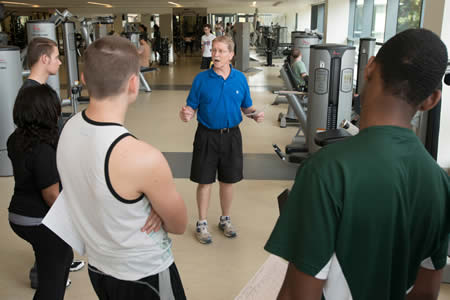Remembering CEHD Professor Fred Schack
October 4, 2018

Professor Fred Schack teaches PHED 108: Weight Training and Body Conditioning at the RAC at Fairfax campus. Photo by Alexis Glenn/Creative Services/George Mason University
Fred Schack’s colleagues at the College of Education and Human Development described him as “steady,” “consistent,” and “dependable.” If there was work to be done, he would volunteer to do it. He was also remembered for always being on time, pitching in with colleagues, and always supporting students.
Basically, “he was there,” says Rich Miller, a professor of kinesiology at George Mason University.
Schack, who retired from his position as a professor of kinesiology and physical education this past June, died in September following a short illness. He was 76. More than half of his life was spent as a faculty member at Mason.
With 43 years of service to our university, he was one of the longest-serving faculty members in Mason’s history. He helped to transform Mason from a sleepy commuter school in Fairfax to the largest public comprehensive research university in Virginia. He was so proud to be a faculty member at Mason and so very proud of the evolution of the university.
“He was a steady influence and an important mentor for literally thousands of students over the years,” says CEHD Dean Mark Ginsberg.
But his work went beyond the guidance he provided to so many students over the years, according to Miller. In fact, it was Schack who advocated for the idea that physical education should be applied outside of school settings.
While it sounds obvious now, in the 1970s and 1980s there wasn’t much physical education to speak of outside of school other than a few self-proclaimed fitness gurus. At the time, it was a brand-new idea.
Schack was born in 1942 and grew up in southern California. After graduating from high school, he enlisted in the Navy and received his bachelor’s and master’s degrees in kinesiology and motor learning while serving in the U.S. Navy Reserve.
In 1975, Schack earned his doctorate in adapted physical education from the Ohio State University. He joined the Mason faculty in September of that year and worked at the university until his retirement a few months ago.
He was remembered by his CEHD colleagues as someone who was devoted to his students, his work, his family, and his faith.
“He was known for his commitment to his students, for his commitment to their personal health and their learning,” Ginsberg says. “He was always committed to their growth and development and being there for them.”
Miller remembered Schack as a supportive presence who was happy to give good advice when asked. He was a respected colleague whose memory and legacy will be remembered. He will be missed. “You could always expect Fred to be there,” Miller says. “He didn’t even offer. He was just there.”
